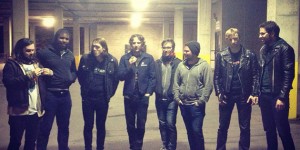Sharon Van Etten takes the reins with 'Are We There'
by Nicole Villeneuve
May 26, 2014
The New York singer talks about her path to independence.
If you became familiar with New York singer/songwriter Sharon Van Etten through her last album, 2012’s excellent Tramp, there’s a good chance it had a lot to do with the names attached to the project—produced by The National’s Aaron Dessner and featuring guests from Beirut and the Walkmen, the album was a milestone for Van Etten. Over time, though, the songs felt buried under the album’s PR angle; Van Etten, off her most successful album to date, felt largely misunderstood.
Her latest, Are We There, out now on Jagjaguwar, aims to bring it back—produced by Van Etten and featuring only her band and a small cast of close friends as guests, the album is proudly personal and, even through the wrenching lyrical frustration, deeply assured.
“The only time I censor is if a song is too personal and I’m afraid it might alienate the listener,” Van Etten says over the phone from New York. “I think this album is nearing that line.”
Van Etten’s intention to take control is obvious out of the gate on Are We There. It moves away from Van Etten’s signature guitar-based sound, moving into slow burn R&B textures, and her vocals are the best they’ve ever been, working around melodies and ranges at times reminiscent of greats like Leonard Cohen and Patti Smith. We spoke with Van Etten about the decision to fully take the reins and make her career’s—and one of the year’s—best work to date.
Where are you right now?
I’m at my apartment in Greenwich Village. Just trying to be home as long as I can before I leave forever.
You had to wait a long time between finishing a record and it coming out. How are you feeling right now?
I feel funny because I still feel like I’m just learning how to talk about it (laughs). I feel like I’m finally a bit more articulate than I was a few more months ago about these songs.
How do you kind of learn to talk about it?
It’s weird, the way I write; it’s not like I’m writing about a character. It’s very personal and it’s all about me. It feels weird to talk about myself for a long time. I get self-conscious about it.
I suppose the place where you are when writing songs can be pretty different than when you’re getting around to answering questions about them, too.
The trouble with these songs is that, every other record has been me looking back and reflecting on things that already happened and I had perspective to be able to write about them. But now, I wrote this record over the past two years while I was on tour, and it still feels like it’s happening.
A lot of it does sound pretty heavy.
These are probably the heaviest songs I’ve ever written for sure. And in a way, they’re the most honest because they’re still current. It’s not me paralleling other relationships, it’s happening now. The theme over the record is having a career, touring, and trying to have a relationship. Troubles come with that when you’re gone nine months out of the year, when your work is your passion, and you love who you’re with. You have to figure out a balance.
Are you any closer to finding the balance you want?
(Laughs) No. I mean, I’ve been working on this for years. I’m just getting to a place where I’m finding that I finally, after working really hard, I’ve always wanted to be here. Or so I thought. But now I wonder what I may have given up in order to do what I’m doing.
If you were writing from a place of being unsure, I wouldn’t have guessed it. You sound completely sure in every way on this record.
When I’m writing it’s because I’m feeling something really intense. I tried really hard not to filter myself too much. It’s pretty raw, everything is pretty fresh. I guess that’s why it’s really intense (laughs).
Was it a fake-it-till-you-make-it kind of mentality, then?
This is the first time I’ve had my band around to work on a record. We only worked together as a band while touring Tramp. We really got close. They saw a lot of what was going on in my life, from touring to going in the studio, and I was able to be pretty candid with them. That was a strength on the record. It helped me be more confident and open. The people that I play with help me be more confident.
It’s your family when you’re on the road.
They become your home, they become your family. You go through really intense situations together, sometimes not under the best circumstances. You’re in each other’s faces, flying down the highway with five other people in the car. Everybody’s missing their family. Everybody is in it because they’re passionate. It’s hard to balance. But anyone [who] that has that kind of heart, you’re going to get close to. They’re just really good people.
We’ve been through really hard times, and they do feel like family to me. I hope we can play together for a long time. We’re growing together, they’re good friends. It’s been really fun. I’ve never had a band before!
Did having a band change your sound on this record, or was that all you?
I started writing all this while we were on the road. They heard different versions of this while I was working on it, and I’d send them demos all the time when I was home between tours to let them know what I was working on. I really wanted them to see the core of the record. They thought about everything going into it.
When I was in the practice space between tours, it was the first time we had a space we could leave stuff set up. There was an organ hanging around, and because I’m touring all the time and I play guitar, I just wanted a break from it. I didn’t do it on purpose, but I started hearing beats with it, and I started playing drums on the drum kit that was set up, which I hadn’t had access to before.
Was it weird to see fans tracking the new songs on the internet while you toured, leading up to making this album? I hadn’t noticed that before.
Yeah! I don’t know what people are going to think. I used to be a lot more hands on, but I’ve been slowly letting go over the past year. In a way, I want them to really like it, but when I see negative comments and stuff it sets me back for a while, so I don’t really pay as much attention as I used to.
After Tramp had some time to sit with people, how did you end up feeling about the way people understood it?
For the most part, people told me about going through really hard times and my music helping them. But [their stories] were really intense: Suicide, and death, and going through cancer. Like, my songs helped them through those times—that’s a pretty intense thing to hear. I’ve definitely been caught off guard at the merch table, crying with this person telling me about their life. It’s important to me, but it gets heavy sometimes.
And this is the first record you’ve produced, too.
Yeah, with the help of Stewart Lerman. I wanted to bring my band in, I wanted to be the one talking to them and directing them. I wanted to be open and collaborative. But at the end of the day, I still wanted to be in charge of what went on the record. Not like I leave the studio and come back to a new thing, which is what happened on Tramp a couple times. I wanted to be more in control and work with people I trusted and run the show, so I’d feel like [the record] was me for the first time, 100 per cent.
With Tramp, I feel like what ended up driving the narrative was “this is an album that this guy from the National made.”
Totally. From doing interviews and meeting fans and everyone asking me about the National and who played on it—I had a really amazing experience working with Aaron [Dessner], and I wouldn’t take it back. And I’m really proud of that album. I learned a lot from working with Aaron. He helped me learn to communicate with other musicians, helped me take my songs from the bare minimum and [taught me] how arrangements can change the entire feel of a song. So I took that and ran with it. He helped me enormously.
But at the end of the day, I felt like my songs were overshadowed by the cast of characters that played on the record. And even though those were a combination of my friends and his friends, it all felt really scattered between our schedules and so many random people coming in. It was fun, but it was also too much. I wanted to be more in control and have it be a handful of my friends. I wanted to prove to myself that it was my songs that people connected with. And not just [that people were interested] because the National was a part of it.
Working in music media, I’m guilty of looking for the headline too. Do you think that angling hurt how it played out?
That’s what I question. I used to be a publicist, so I know, yeah, that’s going to help, this is going to help, anything that helps. So I went with it, and didn’t know the repercussions that I would feel from it. I’m still proud of the record. I think the songs are really strong. Some are the strongest melodies I’d written to that point. But it turned into something different after touring it, and meeting people. I felt misunderstood.
Do you feel understood now, or, without a lot of people having heard the album yet, do you at least feel like you accomplished what you wanted to?
Yeah! This was all me. It’s all me, it’s my friends, it’s my songs, and it’s everything I wanted. I was there every day when people were coming in, telling them what I wanted, where we were going to start. I was open to ideas and I would direct the ideas. This was the first time that I felt entirely in control. So whether or not people like it… (laughs). That’s for them to deal with. This is the most me. The most forward and the most honest I think I’ve been on a record.

This article originally appeared in the May 2014 Issue of AUX Magazine.
Download and subscribe for free in the app store.
Tags: Music, Featured, Interviews, Pink Wine, Sharon Van Etten





